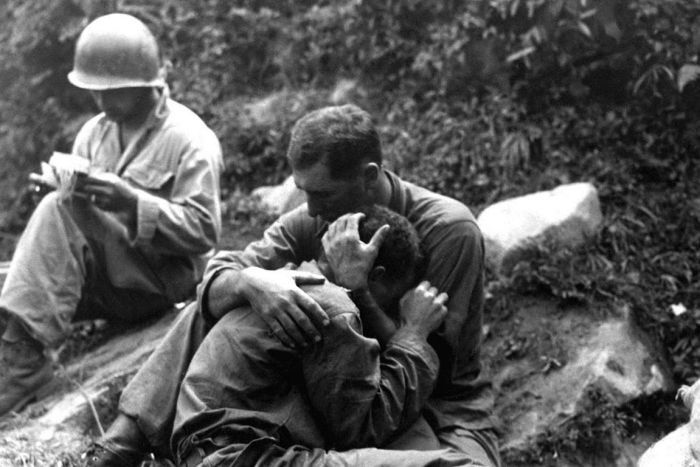Mass Psychological Casualties in Warfare
WWII Vets are called the “Greatest Generation” and they are (were). The object of this post is to point out that the American public’s fear of veterans who have been diagnosed with PTSD (Post-Traumatic Stress Disorder) is over blown; by many.
Hollywood and the news media think they are doing the right thing by educating the public about PTSD, but they do not point out that 99% of those diagnosed with PTSD will be absolutely fine; many with limited help – from their buddies.
In every war in which American soldiers have fought since the 19th century, the chances of becoming a psychiatric casualty – of being debilitated for some period of time as a consequence of the stresses of military life – were greater than the chances of being killed by enemy fire.
The only exception was the Vietnam War, in which the chances were almost equal (Richard Gabriel – No More Heroes). Richard Gabriel, in his excellent book, No More Heroes, tells us that in the great battles of World War I, World War II and Korea, there were more men pulled off the front lines because of psychiatric wounds than were killed in combat. As a matter of fact, more soldiers were lost from psychiatric casualties than all of the physical casualties combined.
There was a study written on this phenomenon in World War II entitled Lost Divisions, which concluded that American forces lost 504,000 men from psychiatric collapse. A number sufficient to man 50 combat divisions! Worst of all were those rare situations in which soldiers were trapped in continuous combat for 60 to 90 days. In those cases, 98 percent became psychiatric casualties.
Fighting all day and all night for months on end is a post 19th century phenomenon. It was not until the 20th century, beginning with World War I, those battles went day and night, for weeks and months without end. This resulted in a huge increase in psychiatric casualties and it got vastly worse when soldiers were unable to rotate out of the battle.
On the beaches of Normandy in World War II, for example, there were no rear lines, and for two months there was no way to escape the horror of continuous fighting, of continuous death. It was learned then that after 60 days and nights of constant combat, 98 percent of all soldiers became psychiatric casualties. What about the other two percent? They were aggressive sociopaths; they were having fun.
The goal of this body of warrior science research is to be better trained and prepared, in order to prevent that from happening to us. The point is that even though it appears we have a large percentage of PTSD cases coming out of the current conflicts, they are no more than any other war. This is important because the public was never scared of returning vets before and they should not be now.
The moral of the story: As usual, the media and Hollywood get everything wrong.
SF DKD
